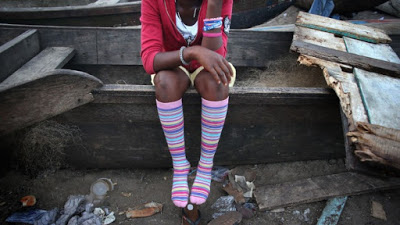What is breast ironing and how common is it in Britain?
 |
| UK NEWS |
Pressure is mounting on the government to outlaw “breast ironing” in Britain.
Conservative MP Jake Berry is leading calls for the practice to be made a criminal offence after it was revealed that hundreds of girls in the UK could be affected.
What does breast ironing involve?
Breast ironing uses heated objects, including stones and hammers, to flatten a girl’s breasts and stop them from developing.
It’s typically carried out when the girls are aged between 11 and 15, as they enter puberty, and is often done by the victim’s own family under the “misguided intention” of protecting her from rape and sexual harassment, according to the United Nations.
One victim from Cameroon told Channel 4 News: “I remember my dad kept going on and on about the fact my breasts were coming out [and said:] ‘Men are going to be looking at her.'”
As well as extreme pain and psychological damage, the practice puts the young women at increased risk of developing cysts, infections and even cancer.
“A lot of the [victims] have inverted nipples; they’re not able to breast feed their children,” Geraldine Yenwo, the founder of Came Women and Girls Development Organisation, told Sky News.
Where does it happen?
According to UN estimates, up to 3.8 million girls worldwide are affected. Breast ironing is particularly widespread in the West African nations of Cameroon, Guinea-Bissau, Chad, Togo and Benin.
“In Cameroon, up to 50 per cent of girls as young as ten years old undergo terribly painful breast ironing on a daily basis,” the organisation says.
How prevalent is it in the UK?
It is thought that about 1,000 girls in West African communities across the UK have been subjected to the practice, but the figure could be much higher. “The hidden abuse is happening here in Britain and we have to seek out the abusers and push for prosecution,” said Berry, the Tory MP for Rossendale and Darwen.
Why is it not illegal?
There is no specific law banning breast ironing in the UK and no-one has ever been prosecuted for carrying out the practice.
However, offenders can be prosecuted for a range of crimes, including common assault, child cruelty and grievous bodily harm, says Home Office minister Karen Bradley.
“What we’re talking about is child abuse. It is illegal, it is a crime, it is not acceptable,” she said. “The government fully understands this and is absolutely committed to putting a stop to it.”
However, she did admit that “certain professionals” were reluctant to tackle the issue because of “cultural sensitivities”, the BBC reports.
Speaking in parliament, Berry said: “The words ‘culture’, ‘tradition’ or ‘religion’ might come up when trying to explain this absurdly harmful practice, but as in the case of female genital mutilation, these words are only thinly veiled excuses for a ritualised form of child abuse.
“The government needs to work across departments and with GPs and hospitals, including extending mandatory reporting, to shine a light on it.”


